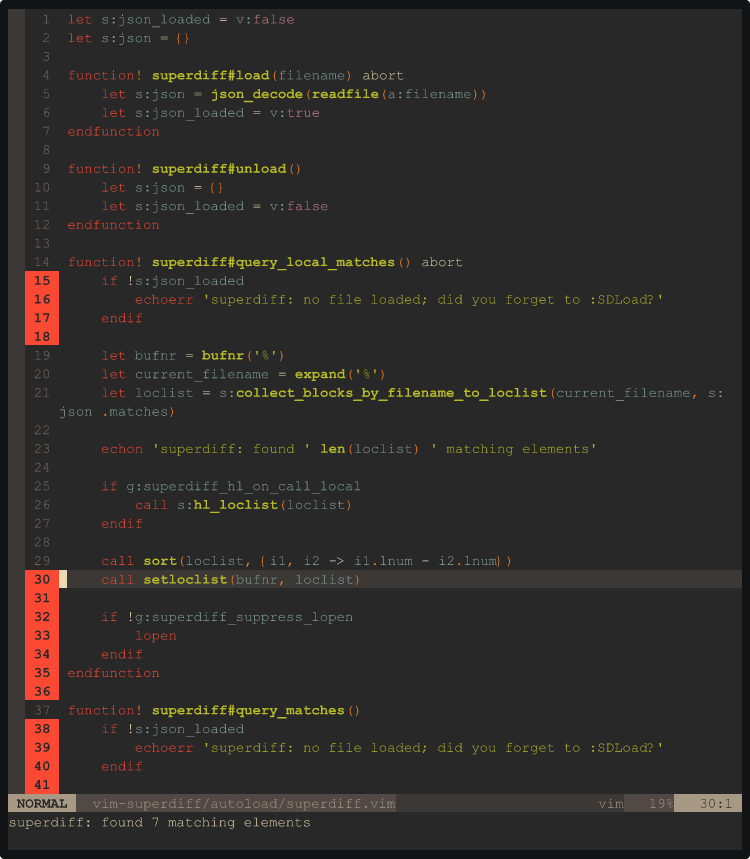7 stable releases
| 2.2.0 | Mar 2, 2023 |
|---|---|
| 2.1.2 | Jan 12, 2023 |
| 2.1.1 | Jan 2, 2023 |
| 2.0.3 | Dec 29, 2022 |
| 2.0.2 | Dec 27, 2022 |
#2328 in Command line utilities
25 downloads per month
38KB
784 lines
superdiff
Are you working to eliminate similar/duplicate code from your files? Do you have a suspicion that chunks
of code are copy-pasted, but are slightly different s.t. normal diff methods don't work? Are you tired
of visually going through and inspecting your code for repeating chunks?
If so, this might be the tool for you!
Features
- Finds duplicate code slices
- Finds similar-enough code slices
JSONreporting forjqintegeration- Fast enough (00:01:12 for a 17k LOC with block size 10 and Levenshtein threshold 10)
- Can check for duplicate code across multiple files
- Vim integration!
- Multithreaded
Limitations
- Not instantaneous for large files
- Multithreading only applies for multiple files (no difference when running on a single file)
Short examples
$ superdiff -l 1 -b 5 examples/really-bad-code.py
=== MATCH ===
File: examples/really-bad-code.py
Lines: [5, 11]
Size: 5
$ find src vim-superdiff -type f | superdiff -l 1 -b 7 --worker-threads 4
=== MATCH ===
File: src/types.rs
Lines: [87, 185]
Size: 7
=== MATCH ===
File: vim-superdiff/autoload/superdiff.vim
Lines: [136, 152]
Size: 7
Usage
Say you have some file examples/really-bad-code.py that you want to inspect.
examples/really-bad-code.py
#!/usr/bin/env python
class SomeClass:
def __init__(self):
self.alpha = 12
self.beta = 14
self.gamma = 16
self.is_bad = True
def reset(self):
self.alpha = 12
self.beta = 14
self.gamma = 16
self.is_bad = True
def do_something(self):
d = {}
import random
for i in range(20):
if i % 3 == 0: continue
d[i] = random.randrange(1, 1001)
d[i ** 2] = d[i] ** 2
d[d[i]] = i
def do_something_else(self):
d = {}
import random
for i in range(21):
if i % 3 == 1: continue
d[i] = random.randrange(1, 1001)
d[i ** 2] = d[i]
d[d[i]] = i
inst = SomeClass()
inst.reset()
You have a feeling that it might be bad, so you use the tool.
$ superdiff -b 4 examples/really-bad-code.py
=== MATCH ===
File: "examples/really-bad-code.py"
Lines: [5, 11]
Size: 5
A total of 1 unique match(es) were found in the 1 file(s).
Wow! That's pretty nice that you found that! But maybe there are places in the file that aren't exact copies, but are similar enough.
$ superdiff -b 4 -t 5 examples/really-bad-code.py
=== MATCH ===
File: "examples/really-bad-code.py"
Lines: [16, 26]
Size: 10
=== MATCH ===
File: "examples/really-bad-code.py"
Lines: [5, 11]
Size: 5
Huh, apparently there is a duplicate function that are pretty similar! And now (assuming that the output of the function is pretty long and not laughably short), you want to know if line 30 is involved in duplicate code, so you do the following:
$ superdiff --reporting-mode json -b 5 -t 5 examples/really-bad-code.py > output.json
$ cat output.json | jq
{
"files": {
"examples/really-bad-code.py": {
"count_blocks": 4
}
},
"matches": [
{
"blocks": {
"examples/really-bad-code.py": [
{
"block_length": 5,
"starting_line": 11
},
{
"block_length": 5,
"starting_line": 5
}
]
},
"files": {
"examples/really-bad-code.py": {
"count_blocks": 2
}
}
},
{
"blocks": {
"examples/really-bad-code.py": [
{
"block_length": 10,
"starting_line": 26
},
{
"block_length": 10,
"starting_line": 16
}
]
},
"files": {
"examples/really-bad-code.py": {
"count_blocks": 2
}
}
}
],
"version": "2.1.2"
}
$ cat output.json | jq '.matches | map(select((.blocks."examples/really-bad-code.py" | any(.starting_line <= 30 and .starting_line + .block_length >= 30))))'
[
{
"files": {
"examples/really-bad-code.py": {
"count_blocks": 2
}
},
"blocks": {
"examples/really-bad-code.py": [
{
"starting_line": 16,
"block_length": 10
},
{
"starting_line": 26,
"block_length": 10
}
]
}
}
]
Note: If anyone finds a better way of making the jq query, please make a pull request and/or let me
know.
Vim integration
It's kind of work-in-progress at the moment, but here's what we have:
- Load JSON with
:SDLoad(make sure you are in the same directory you ransuperdiff) - Open a file to edit
- Run
:SDLocalto highlight matching blocks of code - Run
:SDQueryon a matching block to find other blocks of similar code
Check the vimdocs for more options and commands.
Benchmark
These numbers are here to give a ballpark estimate of how long something would take given some files. It
is not scientific. I simply appended time to the beginning and copied the real time.
The data used for this benchmark can be found in scripts/populate-data.sh.
| Version | Test name | Params | Time |
|---|---|---|---|
| 2.0.3 | TerrariaClone | -b 5 -t 5 json |
40.284s |
| 2.0.3 | TerrariaClone | -b 5 json |
0.489s |
| 2.1.2 | TerrariaClone | -b 5 -t 5 json |
27.876s |
| 2.1.2 | TerrariaClone | -b 5 json |
0.473s |
| 2.2.0 | TerrariaClone | -b 5 -t 5 --worker-threads 4 json |
13.409s |
| 2.2.0 | TerrariaClone | -b 5 --worker-threads 4 json |
0.348s |
Dependencies
~1.5–2.6MB
~49K SLoC
